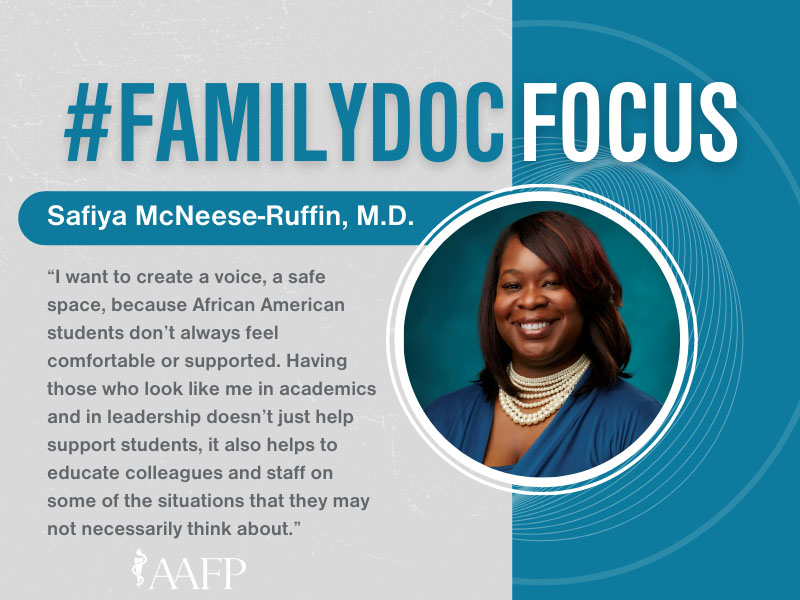Providing a Voice for Minority Students
March 1, 2022, 9:09 a.m. David Mitchell — With Match Day looming on March 18, Safiya McNeese-Ruffin, M.D., offered a reminder that students are much more than their numbers.

“We put a lot of weight on test scores,” said McNeese-Ruffin, the associate program director at Southern Illinois University School of Medicine’s Family Medicine Residency in Alton. “But we don’t necessarily consider that one person may have taken time off from school because they have the money and can focus on studying for the test, whereas another person may have to take it right now while they’re in school; they don’t have that luxury.”
McNeese-Ruffin, who was one of the AAFP’s Health Equity Fellows in 2021-22, said she can empathize with students and residents who face challenges, because she overcame her own, completing undergraduate studies, medical school and residency as a single mother.
“I’ve been through so many situations that I can find a common ground with most of the learners that I come across,” said McNeese-Ruffin, who also is the residency program’s director of obstetrics and women’s health and an assistant professor in SIU’s Department of Family and Community Medicine. “I don’t think that my story is extremely unique. There are other people who have similar stories, and I hope those stories can be heard because those voices are just as important, and they get lost sometimes when we are considering who is worthy of being a physician. We miss out on a lot of the life experiences that some groups can bring to the field of medicine.”
McNeese-Ruffin started college in 1996 but took a break in 1998 to get married and start a family. She was pondering a return to school when her husband left the family.
“I was left with nothing,” she said, “I mean, literally $20 in the bank and debt. You have to decide if you’re going to pay for rent or if you’re going to try to pay this other bill. Those are some of the decisions you have to make when you are in a low-income situation.”
McNeese-Ruffin worked in cosmetology to support her children before getting inspiration from one of her role models.
“My fourth-grade teacher was my first African American teacher, and we stayed in contact over the years,” she said. “When I told her I was doing cosmetology, she asked why. I told her the story, and she said, ‘That’s not what you’re supposed to be doing. I saw great things in you then, and I still do. It’s time to go.’”
McNeese-Ruffin went, along with her then 4-year-old and 3-year-old children, returning to school at the University of Illinois at Springfield to finish her undergraduate degree in psychology in 2003. She later completed the Southern Illinois University School of Medicine’s Medical/Dental Education Preparatory Program before starting medical school there in 2013. She finished her training there, serving as a chief resident.
McNeese-Ruffin, whose father is a U.S. Air Force veteran and physician, paid for her education by joining the U.S. Navy. Her son finished high school in Japan, where she served three years at the U.S. Naval Hospital at Okinawa before spending a year as an assistant professor and attending at the Camp Lejeune Family Medicine Residency in Camp Lejeune, N.C.
“I’ve always wanted to pursue academic medicine,” she said. “African Americans are very much underrepresented in academic medicine. I want to create a voice, a safe space, because African American students don’t always feel comfortable or supported. Having those who look like me in academics and in leadership doesn’t just help support students, it also helps to educate colleagues and staff on some of the situations that they may not necessarily think about. We should not forget about the social determinants of the medical student.”
In December, McNeese-Ruffin joined the SIU residency in Alton, which welcomed its first class last summer. This spring, she plans to implement the project from her AAFP Health Equity Fellowship in three clinics the program serves.
“This is intended to create a new standard of the perinatal course that would incorporate
behavioral health, supportive care through doulas and home visits,” she said. “We intend to create a centering program for the pregnancy course for disadvantaged moms, and I’m hoping that this will not just be for African American women. We do have a disparity there, but I’m hoping that this will eventually create a more comprehensive course for all moms.”
McNeese-Ruffin said women’s health is one of her passions because “women are the center of the family.”
“I feel like taking care of women takes care of the family as a whole because she’s the pivot point for everyone, not only her children but also for husbands and many times the parents of these women,” she said. “She holds the key to their health and their information, so keeping her healthy keeps the family healthy.”